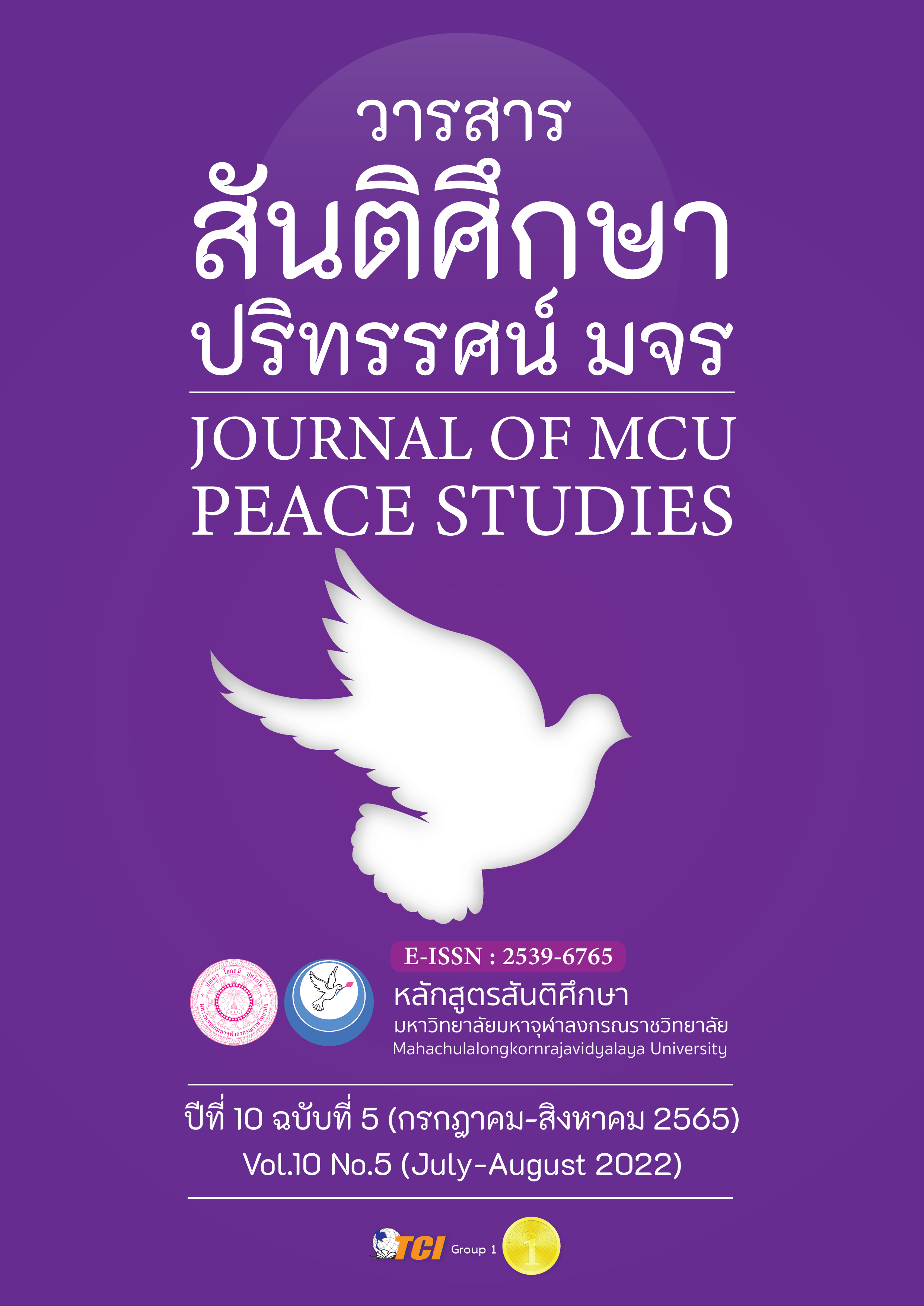การพัฒนารูปแบบการจัดการศึกษาแบบเรียนรวมสำหรับโรงเรียนประถมศึกษา ในประเทศไทย
Main Article Content
บทคัดย่อ
บทความวิจัยนี้มีวัตถุประสงค์เพื่อ 1) ศึกษาสภาพปัจจุบันของการจัดการศึกษาแบบเรียนรวมของโรงเรียนประถมศึกษาในประเทศไทย 2) พัฒนารูปแบบการศึกษาแบบเรียนรวมสำหรับโรงเรียนประถมศึกษาในประเทศไทย 3) เพื่อทดลองใช้และประเมินรูปแบบการศึกษาแบบเรียนรวมสำหรับโรงเรียนประถมศึกษาในประเทศไทย เป็นการวิจัย และพัฒนา มี 3 ระยะ ประกอบด้วย ระยะที่ 1 การศึกษาเอกสารและงานวิจัย การสนทนากลุ่ม การสัมภาษณ์เชิงลึก และการประเมินโครงการการสร้างเครือข่ายในจังหวัดลพบุรี ระยะที่ 2 เสนอรูปแบบในการสัมมนาเชิงวิพากษ์อิงผู้ทรงคุณวุฒิ จำนวน 12 คน [Sc—SEAT—Re] ได้รูปแบบที่มีความเหมาะสมในการนำไปใช้ และเสนอรูปแบบฯและคู่มือการใช้ฯ ต่อผู้เชี่ยวชาญ ระดับอุดมศึกษาจำนวน 5 คน เพื่อประเมินความสอดคล้องของรูปแบบฯ โดยแบบสอบถามมีค่าความเชื่อมั่น 0.95 ระยะที่ 3 ทดลองใช้รูปแบบฯ ในโรงเรียนอาสาสมัคร 3 แห่ง ใน 4 ด้าน ได้แก่ 1) ด้าน Sc (Screening) 2) ด้านโครงสร้าง SEAT มี 4 ด้านย่อยได้แก่ S: Students, E: Environment, A: Activitiesและ T: Tools 3) ด้าน Re: Referral และ 4) ด้าน PAOR โดยรูปแบบฯ นี้ มีคู่มือการใช้งาน ประกอบด้วย 1) ปรัชญา แนวคิดพื้นฐานและวัตถุประสงค์ของการจัดการศึกษาแบบเรียนรวม 2) สาระสำคัญของรูปแบบฯ 3) กระบวนการ PAOR และ 4) เงื่อนไขความสำเร็จของรูปแบบ จากการทดลองใช้รูปแบบฯ ใน 3 โรงเรียน ผลการวิจัย พบว่า ระยะที่ 1 บุคลากรทางการศึกษา ควรได้รับการอบรมให้มีความรู้ความเข้าใจ ตระหนักเรื่องนักเรียนที่ความต้องการพิเศษเรียนรวม ครูขาดความรู้ในเรื่องการคัดกรอง ระยะที่ 2 ได้ องค์ประกอบ 4 ด้าน ได้แก่ 1) ด้าน Sc (Screening) 2) ด้านโครงสร้าง SEAT 3) ด้าน Re: Referral และ 4) ด้าน PAOR โดยผู้ทรงคุณวุฒิสรุปว่า รูปแบบ และ คู่มือการใช้รูปแบบมีความเหมาะสม ในระยะที่ 3 การปฏิบัติงานของโรงเรียนทั้ง 3 แห่ง ภาพรวมอยู่ในระดับมาก
Article Details

อนุญาตภายใต้เงื่อนไข Creative Commons Attribution-NonCommercial-NoDerivatives 4.0 International License.
ทัศนะและความคิดเห็นที่ปรากฏในบทความในวารสาร ถือเป็นความรับผิดชอบของผู้เขียนบทความนั้น และไม่ถือเป็นทัศนะและความรับผิดชอบของกองบรรณาธิการ ยินยอมว่าบทความเป็นลิขสิทธิ์ของวารสาร
เอกสารอ้างอิง
Burns, M. K., Deno, S. L., & Jimerson, S. R. (2007). Toward a Unified Response-to-Intervention Model. In Handbook of Response to Intervention (428-440). U.S.A.: Springer.
Chatakarn, V. (2015). Action Research. Surat Thani Rajabhat Journal, 2(1), 29-49.
Chinchai, S. (2008). The Development of Collaborative Inclusion Model for Students with Special Needs: A Case Study of Inclusive School in Chiang Mai Province. Chiang Mai Assoc Med Sci, 43(1), 51-62.
Chollatanon, B. (2003). The Manual of Inclusive Education by SEAT Project. Bangkok: Paetai Printing.
Eklund, K., & Dowdy, E. (2014). Screening for Behavioral and Emotional Risk Versus Traditional School Identification Methods. School Mental Health, 6, 40-49.
Janus, M., Lefort, J., Cameron, R., & Kopechanski, L. (2007). Starting Kindergarten: Transition Issues for Children with Special Needs. Canadian Journal of Education, 30(3), 628-648.
Kettler, R. J., Elliott, S. N., Davies, M., & Griffin, P. (2011). Testing a Multi-Stage Screening System: Predicting Performance on Australia’s National Achievement Test Using Teachers’ Ratings of Academic and Social Behaviors. School Psychology International, 33(1), 93-111.
Lane, K. L., Oakes, W., & Menzies, H. (2010). Systematic Screenings to Prevent the Development of Learning and Behavior Problems: Considerations for Practitioners, Researchers, and Policy Makers. Journal of Disability Policy Studies, 21(3), 160-172.
Loachai, S., & Loachai, S. (2017). The Inclusive Education Model for the Children with Special Needs (Khob Fah Kwang Classroom) Wat Klang Municipal School at the Education Office of Khon Kaen Municipality. College of Asian Scholars Journal, 7(Special Issue), 186-194.
Lop Buri Primary Educational Service Area Office 1 and 2. (2019). Action Plan for Academic Year of 2019.
McCoy, S., Shevlin, M., & Rose, R. (2019). Secondary School Transition for Students with Special Needs in Ireland. European Journal of Special Needs Education, 35(2), 154-170.
McIntosh, K., & Goodman, S. (2016). Integrated Multi-Tiered Systems of Support: Blending RTI and PBIS. New York: Guilford Press.
Moore, S. A. et al. (2015). Conducting Universal Complete Mental Health Screening Via Student Self-Report. Contemporary School Psychology, 19, 253-267.
Phukabkhao, P. (2010). The Proposed Policy for the Effectiveness of Inclusive Schools in Khon Kaen Province. (Doctoral Dissertation). Khon Kaen University. Khon Kaen.
Saimek, B., Roonchalearn, T., & Ausvaphum, S. (2012). An Operation Model for Effective Mainstreaming on Teaching-Learning for Learner Disabilities in Basic Education School Under the Office Educational Service Areas in Ubon Ratchathani Province. Journal of Education Burapha University, 6(1), 87-99.
Siriratleka, T. (2017). The Mental Health Screening for School Ages Children. Bangkok: Beyond Publishing.
Sriphong, S. (2017). Inclusive Education Model of Students with Learning Defects in Schools Under the Office of the Basic Education Commission. Mahachula Acadimics Journal, 2(2), 197-215.
Thai Government Gazette. (1999). National Education Act B.E. 2542 and Its Amended (No. 2) B.E. 2545. (Vol. 116, Part 74 a, 19 August, B.E. 2542).
Thai Government Gazette. (2007). Constitution of the Kingdom Of Thailand, B.E. 2550. (Vol. 124, Part 47, 24 August, B.E. 2550).
UNESCO. (1994). The Salamanca Statement and Framework on Special Needs Education. Paris: UNESCO.
Uttayotha, S. (2014). The Development of Supporting Services Model for Student with Special Needs in Higher Education: A Study of Mission of Supporting Organizations in Supporting Services for Student with Special Needs in Chiangmai Rajabhat University. Rajabhat Chiang Mai Research Journal, 15(1), 39-49.
Uttayotha, S. (2017). The Development of Inclusive Education Model for Children with Special Needs Based on Learning in 21st Century by Using Coaching and Mentoring Method with Collaborative Local Organization Network in Chiang Mai. Journal of Education Research Faculty of Education Srinakharinwirot University, 12(1), 226-240.
Vorapanya, S. (2008). A Model for Inclusive Schools in Thailand. (Doctoral Dissertation). The University of Oregon. U.S.A.
Vorapanya, S., & Dunlap, D. (2014). Inclusive Education in Thailand: Practices and Challenges. International Journal of Inclusive Education, 18(10), 1014-1028,
Vorapanya, S., & Pachanavon, A. (2019). The Policy into Practices for Inclusive Schools in Lop Buri Province. (Research Report). Lop Buri: Tepsatri Rajbhat University Research Institute.
Vorapanya, S., Parchanavon, A., & Hankla, C. (2020). A Project Evaluation for Administrators’ Network to Support Inclusive Schools in Lop Buri Province. Educational Administration Journal, 32, 154-166.
Walker, B., Cheney, D., Stage, S., & Blum, C. (2005). Schoolwide Screening and Positive Behavior Supports: Identifying and Supporting Students at Risk for School Failure. Journal of Positive Behavior Interventions, 7(4), 194-204.


